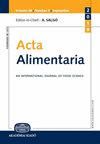评价消化和未消化角豆酚提取物的抗菌潜力:对选定肠道微生物群的影响
IF 1
4区 农林科学
Q4 FOOD SCIENCE & TECHNOLOGY
引用次数: 0
摘要
角豆果肉是多酚的天然来源,已被证明具有健康益处。这些化合物在启动、塑造和调节肠道微生物群中起着至关重要的作用。本研究的目的是评估角豆果肉酚提取物对体外胃肠道消化前后9组特定肠道微生物群的影响。还测试了纯没食子酸和香豆酸的效果。结果表明,经处理的酚类化合物对大多数病原菌的生长均有抑制作用。特别是没食子酸,对单核细胞增生李斯特菌表现出最有效的抗菌作用,使其生长速度降至5%以下。金黄色葡萄球菌和大肠杆菌的生长速度下降了10%。此外,两种酚酸,在消化前和消化后,导致大肠杆菌O157:H7数量略有减少。暴露于酚类提取物后,益生菌的减少最小。然而,干酪乳杆菌的生长。鼠李糖被显著抑制了近50%。有趣的是,与益生菌相比,体外消化过程对致病菌的抗菌作用更强。这些结果突出了角豆酚提取物在调节肠道微生物群方面的潜力,从而为基于饮食的健康策略的发展提供了有趣的前景。本文章由计算机程序翻译,如有差异,请以英文原文为准。
Evaluation of the antimicrobial potential of digested and undigested carob phenolic extracts: Impact on selected gut microbiota
Abstract Carob pulp is a natural source of polyphenols, which have been shown to possess health benefits. These compounds play a crucial role in initiating, shaping, and modulating the gut microbiota. The objective of this study was to evaluate the impact of carob pulp phenolic extracts on nine specific groups of human gut microbiota before and after in vitro gastrointestinal digestion. The effects of pure gallic and coumaric acids were also tested. The results showed that the treated phenolic compounds exhibited inhibitory effects on the growth of most pathogenic bacteria. Gallic acid, in particular, demonstrated the most potent antimicrobial effect on Listeria monocytogenes , reducing its growth to below 5%. Staphylococcus aureus and Escherichia coli showed a growth reduction of up to 10%. Furthermore, both phenolic acids, before and after digestion, led to a slight reduction in E. coli O157:H7 numbers. Probiotic bacteria experienced minimal decrease following exposure to phenolic extracts. However, the growth of Lactobacillus casei ssp . rhamnosus was significantly inhibited by almost 50%. Interestingly, the in vitro digestion process exhibited a stronger antibacterial effect against pathogenic bacteria compared to probiotic bacteria. These results highlight the potential of carob phenolic extracts in modulating the intestinal microbiota, thereby offering interesting prospects for the development of diet-based health strategies.
求助全文
通过发布文献求助,成功后即可免费获取论文全文。
去求助
来源期刊

Acta Alimentaria
农林科学-食品科技
CiteScore
1.80
自引率
0.00%
发文量
47
审稿时长
18-36 weeks
期刊介绍:
Acta Alimentaria publishes original papers and reviews on food science (physics, physical chemistry, chemistry, analysis, biology, microbiology, enzymology, engineering, instrumentation, automation and economics of foods, food production and food technology, food quality, post-harvest treatments, food safety and nutrition).
 求助内容:
求助内容: 应助结果提醒方式:
应助结果提醒方式:


